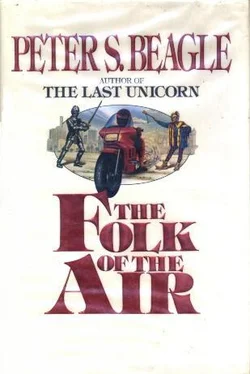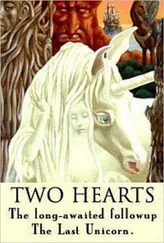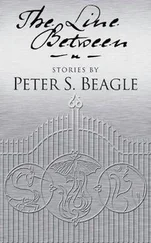“I was just thinking about you,” she said. She leaned back against his arms, resting her own arms stiffly on his shoulders. Farrell nodded smugly. “Of course you were. That’s because I called you here. You weren’t even in Avicenna until maybe five minutes ago.”
Julie raised one eyebrow, and Farrell recalled a long, tipsily innocent spring night she had spent in trying to teach him to do that. “Well, somebody’s been feeding a cat on Brendan Way for the last two years.” Farrell began an indignant growl, but she interrupted him calmly. “I’m no good about letters, you know that. Anyway, I knew you’d show sooner or later. One of us always conjures up the other.”
He stood peering at her, frowning with the effort of relearning her face, as students ambled by, pushing bicycles and laughing through sandwiches. A dishy, merry, barn-owl face, every feature too large for conventional Western beauty, except the nose, which was too small. But her skin remained as clear and translucent as white wine, and the bones beneath were, at thirty, beginning to keep their old promise of pride and steadfastness. Her face has secrets now, like Ben’s face. I wonder if mine does . Aloud he said, “Nothing changes. You still look like an Eskimo.”
“You still haven’t seen one.” He realized that he had never held her this long before; usually, no matter how joyous the welcome, they let go quickly and stepped away, a single precise pace. This time, both of them trusted their full weight to the strength of the awkward clasp, leaning apart but keeping firm hold. They might have been children playing a street game, swinging each other inside a circle chalked on the sidewalk.
“You didn’t marry old what’s-his-face,” he said. “Alain, the archaeologist.”
Julie giggled. “He was a paleoethnologist. Still is, I guess, back in Geneva. No, I didn’t marry him. Almost, though.”
“I liked him.” Farrell said.
“Oh, he liked you,” Julie said. “They always do. You’re such a nice fellow. They think you’re not a threat, and you know they’re not.”
A couple of fraternity boys were shouting at them from a second-floor window, “Action! We want some action down there!” The night faces were coming on duty now, floating down toward Parnell like Portuguese men-of-war. Pierce/Harlow hurried by—Farrell would have sworn it was Pierce/Harlow—leading two Dobermans; and a woman lugging a huge signboard that likened a local judge, in four colors, to the Horned Beast of the Apocalypse, banged it savagely against Julie’s legs to get past. And still they stood within their invisible circle, both gaping absurdly in growing bewilderment. One of them was shaking, but Farrell could not tell which one.
“That record you were going to make,” she said, “with Abe and that crazy drummer. Danny.”
“It didn’t work out.” Their voices were becoming steadily softer, cracking thinly.
“I looked for it.” A monk shoved a lighted stick of incense between Julie’s fingers, and then asked her in a Bronx accent for a few pennies for Krishna. Farrell heard himself say wonderingly, “Let’s go home.”
Julie did not answer him. Farrell put his hand on the back of her neck. For a moment she closed her eyes and sighed like a child falling asleep; then, as the hooting from the fraternity house redoubled, she turned in his arms, saying angrily, “No, no, damn, that’s absolutely all I need.” Farrell began to speak, but she pulled his hand away, brushing it gently across her cheek before she let it go. She said, “No, Joe, I don’t think so. It would be sweet and happy, but we’d better not.”
“It’s time, Jewel. It’s exactly time, this minute.”
She nodded, still not quite looking at him. “But sometimes you let things go by, even when it’s time. Because you don’t know what you’ll be afterward.”
“Hungry,” Farrell said. “I’ll cook dinner. I’ve never cooked for you.” Two young men wearing mime-white face and Danskins passed them, talking about crampons, carabiners, and prusicking. Across the street, a candidate for something gave a printed flyer to a person dressed as a huge parrot. Julie said, “Joe, damn it, I’m going shopping, I have to pick up some drawing supplies, they close in twenty minutes.”
Farrell sighed and lowered his arms, taking a step backward. “Well,” he said. “Maybe it’s not time.” She looked straight at him then, but he could not tell whether she felt regret, annoyed embarrassment, or a relief as sour and jumbled as his own. He put his hands in this pockets. “Anyway, it’s wonderful to see you,” he said. “Look, I’m staying up on Scotia with a couple of friends. It’s in the book, Sioris , it’s the only one there is. Call me. Will you call me?”
“I will,” Julie said, so softly that Farrell had to read her lips to make out the words. He kept backing away, knowing—even without the whistles and guffaws of the fraternity boys—that he looked ludicrously as if he were withdrawing from the presence of royalty. But he knew also that she would not call, and it seemed to him that he had once again stumbled across something irreplaceable just at the moment of its extinction. He said, “Check the clutch on that monster, Jewel. It might be slipping a little.”
He was striding briskly toward Parnell, shoulders only a little hunched, when she said, “Farrell, come back here,” loudly enough that a baying chorus immediately took it up: “Farrell, you get back there this minute!… You heard her, Farrell!” When he turned, he saw her beckoning forcefully, ignoring the second-floor gallery. He approached her with some hesitation, wary of old of the half smile playing like a kitten with one corner of her mouth. The last time he had seen that particular smile, they had both been in a Malaga jail fairly shortly thereafter.
“Get on,” she said. She pushed the BSA off the kickstand and straddled it, waiting for him. When he only stared, oblivious to highly detailed instructions from their audience, she repeated the command sharply without looking back as she tugged her helmet on.
“Shopping,” Farrell said. “What happened to shopping?” Julie started the engine, and the air around the BSA danced to life, this time enclosing them within a roaring privacy—a momentary country, trembling at the curb. Outside, beyond their borders, the honey-slow twilight was thinning and quickening to a cold, dusty lavender. Skateboarders hurtled past like moths, urgently contorted, one-dimensional in the pale headlights rushing up the hill toward them. Farrell sat down behind Julie again.
“Where are we going?” he asked. The street was beginning to swirl around them, as certain protective inscriptions will do when the magic has been spoken right. Julie turned to face him and stood her stick of incense upright in his hair. “Let’s wait and see where the bike wants to go,” she said. “You know I never argue with my bikes.”
My,” he said, “what kind of motorcycle is a Tanikawa?”
“A dirt bike. Don’t move, stay with me.” She was propped on his chest, looking at him, her smile lifting as delicately as the corners of her eyes. The pupils were narrowing to normal size again. Farrell said, “You smell so good. I can’t believe your smell.”
Julie kissed his nose. She said, “Joe, you’re thin. I never imagined you’d be so thin.”
“Coyotes are thin. That’s my totem, the coyote.” He put a hand up to touch her cheek, and she let her head rest on it. “I never imagined you imagining me like that. Hussy.”
“Oh, you try people on,” Julie said. “Didn’t you ever wonder about me at all? As much as you wonder?” Now she lowered herself against him, her face cool on his throat, her body surrounding him like water. But when he said nothing, she dug her chin into him and pulled his hair. “Come on, Joe, it’s been ten years, eleven years now. I want to know.”
Читать дальше












